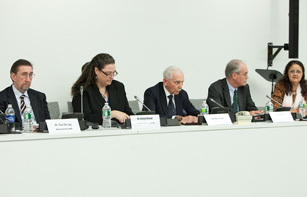Global leaders oppose policies as discriminatory and bad for business
GENEVA/NEW YORK, 28 November 2012—This World AIDS Day, Chief Executives (CEO’s) from some of the world’s largest companies are calling for an end to travel restrictions for people living with HIV. More than 40 CEOs have signed an unprecedented pledge urging the repeal of laws and policies in 45 countries that still deport, detain or deny entry to people solely because they are living with HIV.
The CEOs represent nearly 2 million employees in industries from banking to mining, travel to technology. They include companies like Johnson & Johnson, The Coca-Cola Company, Pfizer, Heineken, Merck, the National Basketball Association, Kenya Airways and Thomson Reuters.
“HIV travel restrictions are discriminatory and bad for business,” said Chip Bergh, President & CEO of Levi Strauss & Co. “Global business leaders are coming together to make sure we end these unreasonable restrictions.”
The CEO pledge is an initiative of the Joint United Nations Programme on HIV/AIDS (UNAIDS), Levi Strauss & Co. and GBCHealth, a coalition of companies that address global health challenges.
“Restrictions on entry, stay and residence for people living with HIV are discriminatory and a violation of human rights,” said Michel Sidibé, Executive Director of UNAIDS. “Every individual should have equal access to freedom of movement. I urge all countries to remove all such restrictions based on HIV status.”
CEOs oppose HIV travel restrictions because they are discriminatory and because to succeed in today’s globalized economy, companies must be able to send their employees and best talent overseas, regardless of their HIV status.
“It’s time to send HIV travel restrictions packing,” said Kenneth Cole, CEO of Kenneth Cole Productions. “Using our collective might, I believe we can use our influence to eliminate these discriminatory practices."
The United States of America lifted its 22-year HIV travel ban in 2010. Other countries, including Armenia, China, Fiji, Moldova, Namibia and Ukraine, have also recently removed such restrictions. However, 45 countries still deny entry, stay, residence or work visas for people living with HIV. These countries include major hubs for international business.
“Travel restrictions on individuals with HIV are unnecessary and hinder the ability for individuals and companies to operate in a truly global workforce,” said Mark Bertolini, Chairman, CEO & President of Aetna.
Most HIV-travel restrictions were imposed by governments in the 1980s when less was known about the transmission of HIV, and treatment didn’t exist. Since then, we’ve learned how to effectively prevent, manage and treat HIV.
Travel restrictions vary in different countries and can include preventing people living with HIV from entering altogether or deporting foreigners once their HIV status is discovered. Restrictions also include denying work visas, prohibiting short-terms stays for business trips or conferences and blocking longer-term stays or residence for work relocations and study abroad programs.
The CEO call to end HIV-related travel restrictions, first launched at the 2012 International AIDS Conference in Washington, D.C., comes on the eve of Secretary of State Hillary Rodham Clinton’s release of a blueprint that outlines the goals and objectives for the next phase of the United States’ effort to achieve an AIDS-Free Generation.
“Eliminating HIV travel restrictions is a win-win,” said GBCHealth Managing Director and Co-President Michael Schreiber. “It’s the right thing to do from a humanitarian perspective and the right thing to do from a business perspective.”
Participating CEOs:
Aigboje Aig-Imoukhuede, Group Managing Director/CEO, Access Bank Plc; Mark Bertolini, Chairman, CEO and President, Aetna; Cynthia Carroll, Chief Executive, Anglo American plc; Vincent A. Forlenza, Chairman of the Board, CEO and President, BD; Debra Lee, Chairman & CEO, BET Networks; Andy Burness, President, Burness Communications; Lamberto Andreotti, CEO, Bristol-Myers Squibb Company; Muhtar Kent, Chairman of the Board and CEO, The Coca-Cola Company; Richard Edelman, President & CEO, Edelman; Mark R. Kramer, Founder and Managing Director, FSG; Glenn K. Murphy, Chairman and CEO, Gap Inc.; Jonathan D. Klein, CEO and Co-Founder, Getty Images; John C. Martin, PhD, Chairman and CEO, Gilead Sciences, Inc.; Karl-Johan Persson, CEO, H&M Hennes & Mauritz AB; Dr. Chris Kirubi, Chairman, Haco Tiger Brands; Jean-Francois van Boxmeer, Chairman of the Executive Board/CEO, HEINEKEN NV; Victor Y. Yuan, Chairman, Horizon Research and Consultancy Group; Bong Yong Dam, CEO, Hub One International Company Ltd; Jena Gardner, President & CEO, JG Black Book of Travel; Alex Gorsky, Chief Executive Officer, Johnson & Johnson; Kenneth Cole, CEO, Kenneth Cole Productions; Dr .Titus Naikuni, MD and CEO, Kenya Airways Ltd; Chip Bergh, President & CEO, Levi Strauss & Co.; Kaushik Shah, CEO/Director, Mabati Rolling Mills Ltd; Kenneth C. Frazier, Chairman and CEO, Merck; Heather Bresch, CEO, Mylan; David J. Stern, Commissioner, National Basketball Association (NBA); Blake Nordstrom, President, Nordstrom, Inc.; Ji Yong, General Manager, Northeast Pharmaceutical Group Co., Ltd; Douglas A. Michels, President & CEO, OraSure Technologies, Inc.; Ian C. Read, Chairman and CEO, Pfizer Inc.; Tzameret Fuerst, CEO, Prepex; Bob Collymore, CEO, Safaricom; Hiromasa Yonekura, Chairman, Sumitomo Chemical; Liam E. McGee, Chairman, President and CEO, The Hartford; James C. Smith, CEO, Thomson Reuters; Mikkel Vestergaard Frandsen, CEO, Vestergaard Frandsen; Philippe Dauman, President & CEO, Viacom; Richard Branson, Founder, Virgin Unite; Melissa Waggener Zorkin, CEO, President & Founder, Waggener Edstrom Worldwide; Andy Payne, CEO, Wilderness Holdings Ltd; David Sable, CEO, Y&R; William H. Roedy, AIDS Activist and former Chairman, MTVN International









